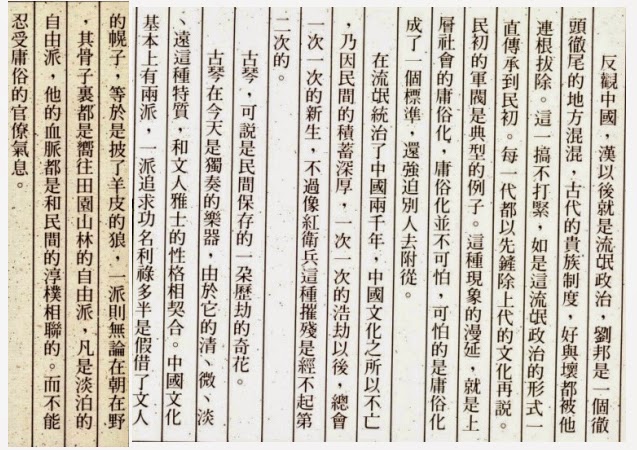節錄張清治先生於1985年的一篇文--[琴境圖說]
Quote from Mr. Chang Chin-Chi's article [Qín Jìng Túshuō] published in 1985
Quote from Mr. Chang Chin-Chi's article [Qín Jìng Túshuō] published in 1985
'古琴尚韻不尚聲勢"
The guqin's resonance is valued higher than its sound volume/
force.
Is my English translation of this saying ok?
Is my English translation of this saying ok?
以下是我的臉簿友們的回應,
我覺得很值得分享,
Below are my FB friends' response and I love this discussion and
would like to share them here...·
- Stephen
C. Walker Flavor/tone
color rather than resonance? Resonance mainly suggests that the sound
is long-lasting.
- Juni L Yeung Stephen C. Walker: What happens if it IS resonance that the source text is talking about? As we know, pre-1603 and post-1603 qin music have drastically different aesthetics...·
- Stephen C. Walker Hence the question-mark. I guess knowledge of the source would help.
- Shuengit Chow 尚韻 : nuance? Its in the suggestion, the play of the entending non spoken sounds which follows the original "attack" as well?
- Peiyou Chang 語出張清治先生於1985年寫的一篇文--[琴境圖說], “Resonance” 的英文是在他文中提出的: “... 古琴尚韻(Resonance), 不尚聲勢. 蓋音樂之道!有以聲勝者, 有以音勝者,有以韻勝者; 若古琴者, 純以韻勝, 不然便是[煩手淫聲], 乃[慆堙心耳], [君子弗聽]. 余以為善品者,品其餘味,善聽者,聽其餘韻...”
*慆堙(tao yin)心耳 –查了字典, 意為喜悅縱慢的音充塞耳朵. - Chen Zhang Mr. Zhang may be limiting the meaning of 韻 by translating it as "resonance" because the word doesn't have the sense of subtle tenor suggested by a sound that lingers even after the sound ceases. Maybe translate it as "lingering tenor"?
- Shuengit Chow when 2 people speak the same sentence, one person might have much more 韻 than another. Person one might be flat saying the sentence, Person 2, with 韻 would give it some charm, with expression, variation of length of syllables, pause etc. 韻 usually follows with " wei (taste)" - its the subtleties of the extending weaker sounds - like a brush stroke with little tails... Like the after taste of good tea and good coffee.
- Jim Binkley this is a good example of why it can be hard to translate something as e.g., 韻 which could be translated resonance and as soon as you do that you lose the other meaning which applies to the construction of all known guqin tunes - "rhyme" - meaning that musical phrases tend to end with contrasting tone colors - an open note and a pressed note being most common. resonance is a reasonable choice here BUT something is lost. But maybe a fair number of guqin players arent aware that yun is a technical term too?
- Peiyou Chang Yes, I agree Yun is a technical term too... just was thinking about the technique "放合"and
- Jim Binkley true
·
-------------------------------------------------------------------------------------
My attempt translation of this part that Mr. Chang Chin-Chi wrote: "琴樂之特色大約有八... 天人合一"
The major 8 qualities of the qin sound:
The major 8 qualities of the qin sound:
音兼金石 Has both the bell (metal) and chime (stone) sound concurrently.
聲希音淡 Fine sound and light tone.
節奏緩雅 Slow and elegant rhythm. (難怪明末的徐青山要說[稚朝飛] 跟[烏夜啼]屬"奇"音, no wonder the [Midnight Raven] was said to be an "unusual" melody by Xu Qing-shan in late Ming dynasty)
韻長味久 Lasting longer the resonance and tone flavor.
情趣靈動 It will bring our emotion and interests to a brighter and attentive level.
神遠體清 It will bring our spirit and body to a faraway, calm and clear stage.
道藝並傳 We will inherit not only the playing skill but the achievement of well personalities.
天人合一 It will help us to be harmonized between nature and human.
For the last one, 天人合一, I think it is also about how to 做人, 調心, 養性 be a human, how to balance our negative and positive thoughts, so we not only can play nice music to please listeners, but also can we be peaceful with everyone and everything. And this is a goal same as practicing meditation, that we can be aware of ourselves, others and nature, and always keep our mind and body centered, and not easily to be disturbed by surroundings. )
For the last one, 天人合一, I think it is also about how to 做人, 調心, 養性 be a human, how to balance our negative and positive thoughts, so we not only can play nice music to please listeners, but also can we be peaceful with everyone and everything. And this is a goal same as practicing meditation, that we can be aware of ourselves, others and nature, and always keep our mind and body centered, and not easily to be disturbed by surroundings. )





